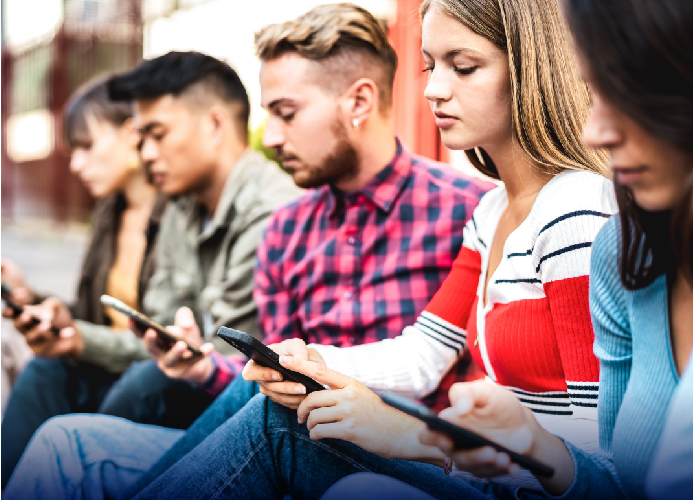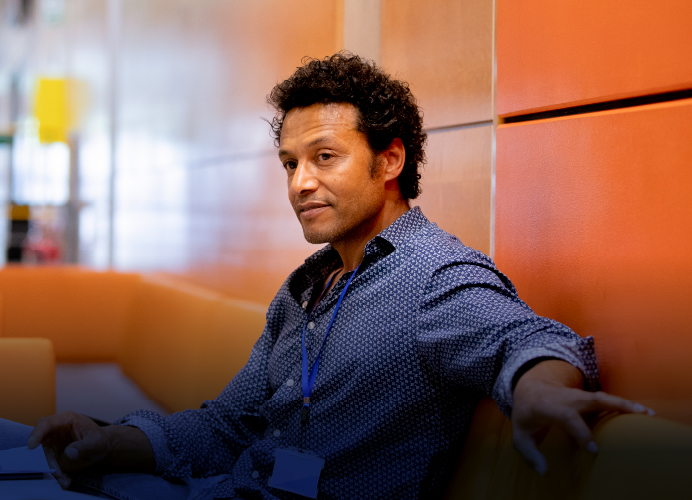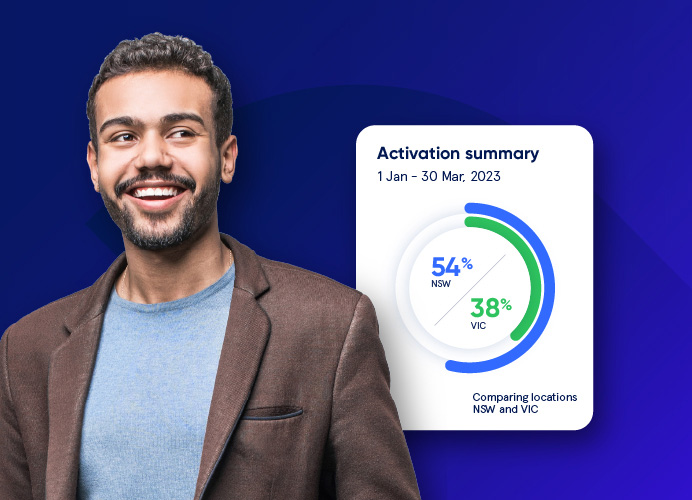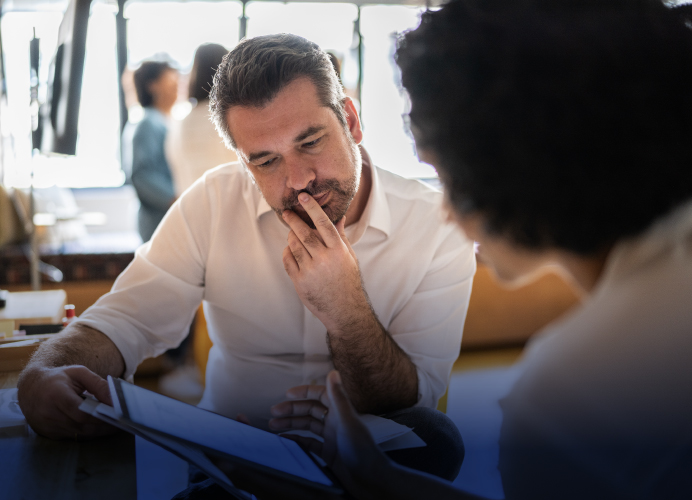How can you support students differently? [Video]

Insights.
Now that the world has been disrupted, what does the new horizon of student support look like? Do we know what constitutes meaningful, relevant, holistic and compassionate care during a period of deep uncertainty?
Sonder’s Dr Jamie Phillips and Robert Chasse recently joined with CISA’s Belle Lim and EQI’s Nathan Pugliese at the Australian International Education Conference (AIEC) to discuss how education providers can support students differently.
Presentation
Presenters
Panellist 1:
Belle Lim, National President (at the date of recording), Council of International Students Australia (CISA).
Belle Lim is an international student from Malaysia. She arrived in Australia in 2013 and has since completed a foundation degree as the dux at Eynesbury College (Adelaide), a Bachelor in Pharmaceutical Sciences with Honours as the Faculty Gold Medallist at Monash University (Melbourne), and is pursuing a PhD in cancer genetics at Monash University and Peter MacCallum Cancer Centre (Melbourne).
She serves as the National President at the Council of International Students Australia (CISA) for 2020-21, representing 700,000 international students in Australia, after serving two terms as the National Women’s Officer in 2018–20. Belle founded Future Female, the first conference focusing on international women in Victoria that has featured high-profile multicultural women leaders and has welcomed more than 1100 attendees.
She was the recipient of the prestigious Victorian International of the Year Premier Award in 2019 and represented Malaysia in the Paris UNESCO Youth Forum in the same year.
Panellist 2:
Nathan Pugliese, Manager, Strategy and Performance, Department of Education, International, Queensland Government (EQI).
Nathan Pugliese is the Manager, Strategy and Performance, for the Department of Education, International (Queensland). He is committed to the future vision of international education and supporting young people to thrive in our changing world.
As an educational leader he is motivated by the Queensland Department’s values of building a better future for every student and advancing the national international education strategy. In his role he is responsible for the development and growth of international student program activities, ensuring a positive financial return, successful student outcomes and school engagement.
As an advocate for student welfare and support he has been instrumental in the development of programs supporting international student safety. He is contributing to the Queensland school sector’s participation in the Australian Government’s International Student Return Travel Exemptions Scheme.
Previous to this role he held leadership positions in Queensland state schools and international schools. His educational background includes a Master of Business Administration and Bachelor of Education.
At the core of his leadership is a passion to partner with others to add value to the international education industry.
Panellist 3:
Dr Jamie Phillips, Medical Director and Head of Member Support, Sonder.
Dr Jamie Phillips MB ChB, AFCHSM, DIMC, RCS(Edin), MRCGP(UK), FACRRM(EM) is a commando-trained military officer who served for 20 years in the UK armed forces and Australian Defence Force as an embedded doctor and operational commander on multiple combat operations around the globe.
He considers himself a specialist rural and remote physician, with advanced specialist training in emergency medicine.As Medical Director at Sonder, Jamie shapes the health culture within the organisation.
Fulfilling both leadership and clinical roles, he is responsible for the quality, safety and responsiveness of the support provided. A practising physician, Jamie maintains his currency working in emergency medicine and as a lecturer at Bond University.
Born and raised in rural England, Jamie studied medicine bilingually at the University of Manchester (UK) and University of Rennes (France), ultimately graduating with medical degrees in both languages.
He is passionate about removing barriers to care and ensuring patients can access quality medical care when and where they need it most.
Host:
Robert Chasse, Manager, Education Partnerships and Integrations, Sonder.
Transcript
Robert Chasse:
Hello everyone. My name is Robert Chasse, I'm going to be facilitating this session and I want to thank each of you for participating in the session, “How can you support your students differently?”.
And I think that we could all agree that this session very much aligns with the conference theme of new horizons, because, you know, I feel it embodies things like, perseverance, change, and most importantly hope.
And the COVID-19 pandemic has been the most extraordinary global event that I think we've experienced in our lifetimes and has fundamentally changed how we operate as individuals, and collectively as a society. And I think we all know this most certainly includes international education and the student experience.
So, I want to start off by asking you Belle, as an international student what was your experience like prior to the pandemic, and how has it changed since?
Belle Lim:
Thank you Robert for having me in this session. So, a lot of the issues that we see now, that are, thinking you know, international students’ experience over the past 12 to 18 months, are not new, such as mental health, accommodation, safety, and community integration. These are kind of long-standing issues that we know that international students do experience.
But what the pandemic has done is that it has amplified some of these issues. And some of the key points that I want to share with the audience today are firstly, the COVID-19 enhanced financial pressure. Financial vulnerabilities that students have, have become very obvious to us during this time.
And you know sometimes I think about my personal experience and from my fellow students, it is very natural for us to be in this position because we are young people, you know early twenties or some of us are under twenties, and we don't have a full-time income, and many of us actually need to work part-time to supplement quite high living expenses here in Australia.
It is expected that students will have family who support us financially and most of us absolutely do require that. But taking into account the currency exchange, the financial investment that the families make are actually very high.
And during COVID, I know personally of students whose families have lost income back home and through no fault of their own, they’re all of a sudden facing this situation where their entire education and life here in Australia are in jeopardy.
There's also, you know, this element that students feel guilty that they're spending a large amount of family savings on their education. And, especially for students that are currently stuck offshore, this doesn't match up with what they signed up for. They're learning the online learning experience, with[out] the full experience of actually learning in Australia. So, this is one big problem that we are facing.
The two other points that I’ll quickly raise are firstly, the increased social exclusion. Students typically don't live in [a] mansion. As you can see behind me, we don't have large spaces to move around, and you have students stuck in small areas. And in this lockdown situation, without the support network of family and friends, it is very difficult.
And lastly, a very heartbreaking issue, that is discrimination and racism. We did observe a rise in racist comments and reports to us and recently we ran a survey from students that told us about, you know, their experiences. We have students from Asian countries like myself feeling like we are being targeted. And they avoid going to the supermarket because they get yelled at and saying it’s their fault. And there are also things like students actively avoiding interacting with strangers in anticipation of this kind of behaviour - leading to social withdrawal. So, here are, you know, some of the issues that we knew initially, but it has been amplified.
Robert Chasse:
Wow. Yeah, that sounds like it has, like you said, hasn't completely changed, but is definitely amplified. And Nathan, I want to ask you, you know with your experience working with the Queensland Department of Education, what impacts to the student experience in the student journey have you seen since the pandemic?
Nathan Pugliese:
Thank you Robert. I couldn't agree with you any more Belle. Particularly around, you know, the emphasis there on amplifying some issues. From a policy point of view, and we here at the Department, looking after a hundred schools with, you know, thousands of international students that are under the age of 18. I agree that some of our policies have got cracks in them that we've had to address, you know, through some stronger risk mitigation.
And I suppose we could never [have] foreseen the scale of the issues that it was going to create. And in reflection, when I, you know, think back to that January period in 2020, we were, you know, really in a position where we had displacement on a large scale.
We had, you know, students that were facing that realisation and that, “Do I go home? Do I do the dash now and go back home to country? Or do I wait this out and stay and pursue my study?”.
And then we had students that were on the other side of the world that were still waiting to come back - they're still on holidays - that were, you know, faced with that proposition of “Well, what's the next steps for me as a student?”.
And also you mentioned, accommodation too, Belle. Absolutely, from supporting younger overseas students, our approach is homestay here in Queensland for government schools and we had that realisation straight away that this is going to cause issues with extra strains on our homestay network and our families who all of a sudden are left supporting an international student. Somebody that would traditionally go home over breaks throughout the year, that would no longer have that as a choice.
You also mentioned student wellbeing. That was absolutely at the forefront of our policies, and particularly around that realisation of, you know, the financial pressures. And in your case, you as an adult, that financial pressure on you. But for our cohort of students, the financial pressures on our parents of our students who are offshore. That and because of the wide scale of COVID, it was impacting, you know, the financial incomes of all families. Let alone the homestay families and the international students here. And those added pressures, particularly around a young person having to process socially and culturally, the media attention that you know the focus on, you know, where the origins are COVID come from and whether the discrimination was direct or indirect, it still had such an impact on, you know, on young people in our schools.
And yeah probably two more, you know, quick points. And one was around it wasn't just the students that were impacted. We had, you know, the staff of our schools, were overwhelmingly impacted by this. And, you know, just Murphy's Law, when would you have lockdowns? You would have them every time that schools are on, you know, supposed to be on, a break. And that would add extra, you know, impacts to the staff wellbeing.
And lastly, the environment. When you think about Queensland and Australia, we are a relatively perceived safe destination. But COVID unfortunately has challenged that. And is there really any city or country that can be potentially COVID-safe? So, these are some of the experiences that we've worked through here as a department.
Robert Chasse:
Yeah, that's interesting. I mean it, what I'm hearing is that it's bringing up a lot of, you know, complexity surrounding student issues, with not only how they're seeking support but how education providers are meeting those needs, and you know, what you're saying here, like a personalised and more importantly, a scalable way.
So, firstly, Dr Jamie, I would like to ask you from your perspective as the medical director at Sonder, what support trends and new support needs have you seen with students? And then to both you and Nathan, how has Sonder and the Department of Education been meeting those needs, at you know, the institutional level?
Dr Jamie Phillips:
Got it. I mean, Belle, Nathan, you raised those points and you're, you know, Belle, with lived experience. I’ve not been through it as a student, but I have been through it as an immigrant. I studied overseas and then I immigrated here as well. And it is about complexity, isn't it Nathan?
It's about, you know, I work in the system, I’m a doctor within the healthcare system and when I came to Australia I didn't understand it. I didn't understand it and I was entitled to medicare and in my role as an E.D. doctor, see a lot of students coming in. They're worried. There's language barriers, there's cultural barriers, and there's huge financial barriers that you raised Belle about accessing care.
“Where do I go? How much is it going to cost? What's that going to impact on me? But how's that going to impact my family, who are supporting me as well?”
And that's why I joined Sonder, because we realised we could probably help people navigate that complexity. And when you don't know what to do and you don't know who you turn to, what we wanted to be was be there.
And certainly Bobby, certainly the trends that we've seen with our international students is, “I’m confused. I’m overwhelmed. I’m stressed, and I don't know who to turn to because my normal support networks aren't there.
Certainly the vast majority of interactions we have are outside normal working hours. 97 per cent of them start by chat. And the beauty of that is we can use software to talk to people in their native language. By chatting in the native language, we still start to build trust and that's what I’m hearing from Belle, and we hear from our students.
It's about a lot of us and we as an Australian community have got to rebuild that for us and that's why you know I’m working with people like Nathan and Belle to try and rebuild that trust.
I mean in terms of trends, it's no different to what everybody else is seeing around the world. It's stress, it's anxiety and depression, and it's loneliness. It's connection, like Belle, you know you're isolated in your room your normal social network's gone.
And certainly, that's the experience that we're starting to receive on the papers recently published in the UK. They've been very clear. They've done huge studies looking at what happens to people's mental health during and after COVID, and it, you know, the evidence is clear. It primarily affects young people, people under 30 are the people most grossly impacted by, with, mental health.
As a result, COVID primarily affects females. Primarily affects people who are culturally, linguistically diverse, people who are not from, originally from, that nation, and people who are isolated.
And so those are the trends we've seen Bobby, and it's about working with students individually but also the community. People like Nathan and saying, “Hey Nathan, how can we help you?” We know all of this stuff about people but we need to rebuild that trust. Connect them with their support network and make them understand that they're a really valuable part of the Australian community. I mean if you look on this call, there's three of us here who live in Australia, who aren’t born in Australia, who are all active participants in Australia. And for me, that's why I came to Australia, because it's that warm safe country that you described Nathan.
Robert Chasse:
Yeah, no, thanks Jamie. And you know, with Sonder and the Department of Education, you know, I know, you're making an effort to meet those needs.
And Nathan, what has the Department been doing, in terms of addressing some of these issues in this changing environment?
Nathan Pugliese:
Yeah, thank you Bobby. Absolutely, I think at the forefront, we had two different cohorts of students that we were particularly interested in working with.
And part of our core values, in behind what we do here as the Department, is to, you know, make those strong realisations [that] when we don't have a strong, you know, policy centre support structure in place, that we need to leverage our partners - partnering and collaborating with others.
So, we had the foundations of a really good system here in Queensland, in behind our 1800 QSTUDY support hotline, but we soon realised that, you know, we needed help in making sense of this world and the over communication and the media sensation. We needed some way of rationalising the help, and that was certainly outside of the scope of potentially what we could do as a department, with our amazing network of, you know, school staff and wellbeing staff that we have.
But we also had that, you know, realisation that we can't just clock off after 10 weeks. You know, a school term, you know, or when we get to holidays, like, the students needed support when we were going to go off on to vacation. So, we had to think outside the box and think differently.
So, the two initiatives that we worked on with Sonder was, one, supporting our homestay students. So, our students that are in accommodation. Particularly those are our younger students, and, so they have the Sonder care package. And I think, you know, for the reasons that I stated before around some of these issues that we identified, safety, you know. COVID challenges the notion of Queensland being a safe place. It also takes, you know, that pressure off the homestay family, because not every student will want to identify or have those personal conversations with their homestay families, as not every student will identify with their teaching staff.
And Belle, I’m sure you can relate to this from a university perspective, that you'll levitate as a young person towards who you want to share information with, and particularly personal health information and medical information. And having the right people to talk to, with the right profession like Jamie, it's critical that, you know, we're connecting our young people with health professionals.
We also, you know, needed to help make sense of all of the information they actually get through their overseas health insurance providers, and also all different free forums, you know, Beyond Health etc. etc.. There is so much information out there, including Dr Google, that young people like to levitate to. So, working with Jamie was a great opportunity for us to really give that key messaging back to our students around, this is on-demand help. This is somebody that you can rely on and communicate in a way that you want to be communicated to, with, as well.
I was just going to say, Jamie, about that application, you know, what are your thoughts in particular around, you know, what we're working on in that area?
Dr Jamie Phillips:
Yeah, I think it goes back to what Belle was talking about. It's about flattening power gradients, isn't it, Belle? When you're new to Australia, the care provider is up here and you as the new person in Australia, especially if you don't speak the language, I knew this when I lived in France, it's really hard.
You feel that power gradient and that was the whole point of the product. You should flatten that power gradient and just say, “Hey no problem is too big for us. It's completely confidential. What can we do?”
You know people will ring up, we will get in touch by a chat with the simplest problem, and when you unpack it, actually it's really complex, because of all those reasons that Belle was talking about and that's why we want to involve all our students in making our product better.
Because actually, it's not us who decides whether it's a good experience, is it Nathan? It’s the students. It’s our members who tell us. And that's the core part of flattening that power gradient and saying, “We are here to help you. Tell us how to make this better.”.
Nathan Pugliese:
Yeah, I reflect on that one, particularly around that deep dive that we took with one of our students, with a different application that we're working with Sonder on, with the returning international students to Queensland.
So, this was an interesting partnership that we formed and what we as the Department wanted. We wanted a solution that Sonder could pre-engage with our students prior to departure, and then during those 14 days of quarantine.
And this student that we explored, his experience, I was fascinated to see the amount of engagements that, you know, Sonder had with this student and not through the tradition, traditional sense of communication as well. There was definitely phone conversations, there was email conversations and notifications but, it was interesting that this young person levitated towards SMS notifications as his primary choice. But in this application, I must say, and we are intending on scaling this up with the return of more international students because it gives us the confidence as a department that we are finding ways to provide quality services to international students, that keep their parents assured that we've got their safety and their wellbeing in the best interest.
Robert Chasse:
Great, and you know, I know we're getting close to time, but you know, Belle you know I’m I’m hearing that there's been a lot of, a lot of the kind of, ‘taking on board of the student voice’ in developing these types of programs. But I really want to know from you, you know, how important do you think it is for the students to be involved in the designing of the changing of these programs, to meet the new complexities and the new challenges?
Belle Lim:
Yes, certainly. So, you know the issues that we discussed earlier are long-standing and they've been in existence for more than a decade, so it is time to rethink.
Robert, you're absolutely right. That's why I really like the topic today, about thinking how can we do this differently. And you know from my role at CISA, I’ve observed firsthand the importance of having students at the table. And I absolutely want to acknowledge a number of stakeholders in the state and federal governments, and sector peak bodies, including the Council for International Education, of course, Sonder and the Queensland government, who actively seek out student representation.
And I think that what is transformative on top of consultation, is integrating students in the process. Having students involved in the process allows us to have deeper insights. And the initiatives that you create will actually serve the objectives and purpose of helping students. The co-design process also makes students feel invested in the project and really ultimately save resources for us.
You know, like what Jamie and Nathan said earlier. We think that it is not enough to see students as customers. It is time to see students as partners and that will ultimately, you know, serve the benefit of everyone.
Another message that I really want to share, in this session, is also how we need to take into account the cultural sensitivity. I think the support services that universities and education providers and other service providers, absolutely need to take into account the different background and diversity that our students have, in order for them to be effective.
And lastly, we also need staff and community on our campuses to have the level of cultural competence.
Robert Chasse:
Yeah, I mean, absolutely. I like how you said, look at us, look at this, as a partnership. I think that's absolutely key.
So, look I think that brings us to time, and I want to thank all of you again for, you know, sharing your insights, your thoughts, your experiences, on how we can you together, as a sector, change the way that we support students, in a real, meaningful way. So, thank you again. Hope you enjoy the rest of the conference, and stay safe.
Want to learn more?
More highlights from this year’s AIEC conference.
More information about Sonder.
About Sonder
Sonder is a leading Australian wellbeing and safety company accredited by the Australian Council on Healthcare Standards (ACHS). Our solution is a technology-driven platform supported by 24/7 safety, medical, and mental health experts. This is backed up by a physical responder network that can be onsite within 20 minutes for time-sensitive scenarios, plus a capability to deliver unique and timely data insights which drive meaningful business decisions.
About Sonder
Sonder is an Active Care technology company that helps organisations improve the wellbeing of their people so they perform at their best. Our mobile app provides immediate, 24/7 support from a team of safety, medical, and mental health professionals - plus onsite help for time-sensitive scenarios. Accredited by the Australian Council on Healthcare Standards (ACHS), our platform gives leaders the insights they need to act on tomorrow's wellbeing challenges today.
Related posts
There's so much more to share
Sonder is reimagining health, safety and wellbeing support. Sonder proves human centric care leads to earlier intervention. Sonder impacts one person at a time to drive meaningful change across an organisation. Sonder understands people and how to support them.






